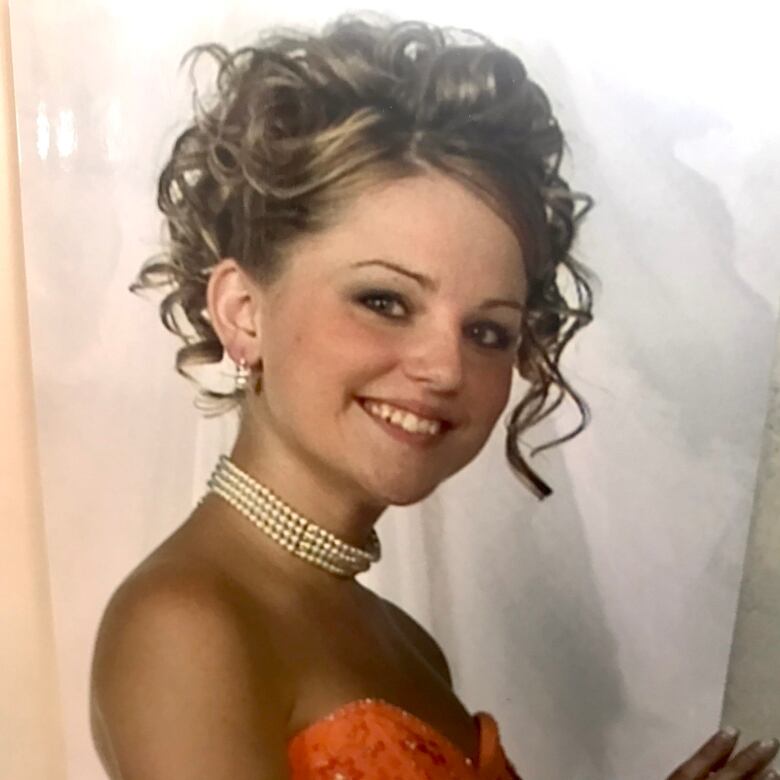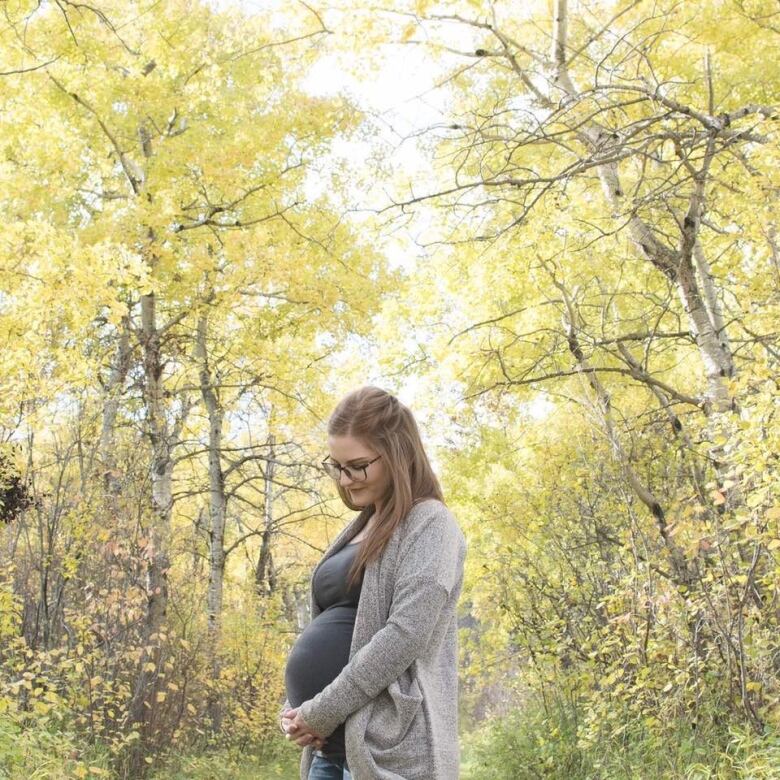Sask. woman who got stomach removed to thwart cancer describes life with ‘ticking time bomb’
[ad_1]
For years, Summer Heide didn’t eat spicy food because the slightest indigestion would trigger fears that she had stomach cancer.
She would lay awake at night, terrified that she would die and leave her children without a mother.
Heide, a 32-year old farmer from southeastern Saskatchewan, isn’t a hypochondriac. A rare and deadly stomach cancer runs in her family, and since learning she inherited a gene mutation that could cause cancer, she’s been forced to make agonizing decisions and take drastic steps to save her own life.
“It was just too much fear over the unknown,” Heide said. “There was always the little bit of ‘When is the ticking time bomb going to go off? When might I get the cancer?'”
DNA discovery
Heide was only a toddler when her aunt, RoseMarie Lawrence, passed away from stomach cancer in 1991. She was just 29 years old.
That kind of stomach cancer, known as diffuse gastric cancer, is particularly sneaky. Cancer cells grow in loose clusters — not a tumour — that can easily move and multiply in the stomach lining. Initial symptoms, such as heartburn, seem innocuous. By the time the cancer is detected, it’s usually too late.
Heide’s uncle, Luke Lawrence, RoseMarie’s husband, remembers asking the doctor whether their two children were at risk of getting the cancer.
“I was very concerned for my children because I knew nothing about cancer,” he said. “[The doctor] says, ‘Cancer is not contagious.’ At that time, they didn’t know anything about hereditary forms of cancer.”

Sixteen years later, his daughter Erin, Heide’s cousin, was diagnosed with the same cancer that had killed her mother.
She was 20 years old and passed away within seven months.
Before she passed away, doctors suggested Erin get genetic testing. She took a blood test, one that didn’t exist before her mother died, and discovered she had a rare mutation in the CDH1 gene that causes Hereditary Diffuse Gastric Cancer Syndrome. It’s a disorder that can pass down through families and puts people at a high risk for developing stomach cancer at a young age.
A child has a 50 per cent chance of inheriting the gene mutation from a parent who is a carrier.
“We didn’t know none of this until it was far too late because Erin had already been diagnosed with Stage 4 of this form of cancer,” Luke Lawrence said. “So [the testing] was to create an awareness for the family, more so than what we could do for Erin. That’s why we did it.”
The family calls it “Erin’s Gift.”
In 2007, Heide and seven other family members went for predictive genetic testing to see if they also carried the gene mutation. Five tested positive, including her grandmother, her father and herself.

Heide was 19 when she got the results.
“It was devastating, obviously, but I think I was so young and naive that I didn’t actually think about what that meant,” she said.
What it meant was Heide’s chances of developing the deadly stomach cancer by age 80 were as high as 83 per cent. Women who have the mutation also have an estimated 60 per cent risk of developing lobular breast cancer in their lifetime.
WATCH | Rare and deadly stomach cancer runs in Saskatchewan woman’s family:
Genetic testing revealed that Summer Heide has a gene mutation that increases her chances of developing a deadly stomach cancer. That discovery has forced Heide to make agonizing decisions that affect her life and the lives of her children. 5:21
Demand for genetic testing increases
Demand for cancer-related genetic testing has increased exponentially over the past two decades, according to the Canadian Association of Genetic Counsellors. Referrals to some genetic testing clinics in the country have doubled or even tripled in recent years.
“Patients are more aware of it, physicians are more aware of it and the testing has become better. The technology has improved,” said Ingrid Ambus, a genetic counsellor at North York General Hospital in Toronto, adding that testing can now diagnose hereditary cancer syndromes beyond the more common ovarian and breast cancers.
Less than 10 per cent of cancers have hereditary causes, but researchers have identified more than 80 genes in which mutations can be passed down through families and potentially cause cancer.
Ambus said patients often find it “empowering” to know that a cancer runs in their family so they can seek counselling, screen for the cancer, make lifestyle changes or have preventative surgery.

A genetic counsellor advised Heide that the only way for her to prevent aggressive gastric cancer would be to remove her entire stomach, a procedure called a prophylactic total gastrectomy.
She met with a surgeon in 2007 but was told there wasn’t enough clinical information available at that time to guarantee that she could have children after a total gastrectomy.
She decided to wait.
Soon, she would have to make another difficult choice.
Passing on the gene
When Heide and her husband were ready to have children, they had the option to do in-vitro fertilization (IVF) with pre-implantation genetic diagnosis on her embryos. That would have allowed them to only implant embryos that didn’t have the mutation.
“I didn’t want to do that,” Heide said. “I do feel like some feel, like, it’s a little bit selfish, because I could spare my kids from having the gene. But I wouldn’t get the kids that I have if I were to choose that, and I would never choose anybody different.”

After Heide and her husband had their first two children, Mikka and Harlow, her anxiety began to grow. She was tortured by the fact that her cousin Erin had passed away just seven months after diagnosis. Heide wondered whether cancer was already forming inside her.
“No one would love [my daughters] like me. So every, like, Christmas or birthday, or any type of holiday, I would always go above — take lots of pictures, make it perfect — in case it was their last one with me,” she said.
Heide still resisted the idea of getting an invasive surgery to remove her stomach. She was worried about long-lasting side affects, including diarrhea, vomiting and fatigue.
She’d also had one of her veins cut during a routine endoscopy — a diagnostic test to look for cancer — and began to vomit blood and lose consciousness.
“I was mentally making peace with myself and God that maybe my time had come. That shakes a person deeply,” she said.
From that point on, she had a deep fear of medical procedures. She would schedule a gastrectomy, then cancel.
Game changer
Then, in 2014, her younger sister, Ali Kowaluk, decided to get genetic testing.
Kowaluk admits she had procrastinated. Then she got married and began to contemplate having children. She knew it was time to visit a genetic counsellor at the Royal University Hospital in Saskatoon.
She tested positive for the gene mutation and knew immediately that she would have the surgery.

Kowaluk had her entire stomach removed at the age of 23. Afterward, the surgeon told her that tests on tissues removed from her revealed Stage 1 cancer.
“So that was hard to hear, still hard to talk about. I don’t talk about that part very much,” Kowaluk said, choking up.
Undetected, the aggressive cancer would have certainly gone on to kill her. The surgery saved her life.
“I could not be here today,” Kowaluk said.
Now a mother of one-year-old Winston, Kowaluk is shaken by how close she came to passing away like her cousin Erin.
Kowaluk’s near-death experience was a wake-up call for her big sister, Heide.
One night, after both of her daughters fell asleep during their bedtime story, one curled up under each arm, Heide lay there praying to God and silently sobbing. The next morning, she woke up with mental clarity. It was time to have the surgery.
“Knowing you carry a gene with such devastating potential is a heavy weight to carry. It was heavier than I could mentally handle any longer,” she said.

Heide got her stomach removed at Calgary Foothills Hospital in 2015.
The recovery took nearly a year and was excruciating, she said. She could barely get off the couch some days.
Two years after the surgery, despite not knowing if it was possible, she got pregnant and had a third child, a boy named Huxley. It seemed to reset her body, she said.
The next generation
Today, Heide stands in her kitchen, sunshine pouring through the window, snacking on tiny bites of chicken and cottage cheese.
The 5-foot-5, 105-pound woman eats every couple of hours and only small amounts, because she doesn’t have a stomach to digest and store food. She has to chew everything until it’s mush, and eating and drinking fluid at the same time pushes food into her small intestine too quickly and makes her sick.
Heide has reached a level of peace and confidence with her health that she hasn’t had in years.
“Of course, I wish we didn’t have this gene, but it’s also a gift that we know about it, because I might not be sitting here today if I didn’t know about it,” she said.
Unfortunately, her worries aren’t over.
“The worry about myself has now been put onto my kids, because I just worry and hope that none of them have the gene,” Heide said,
Each of her three children, and Kowaluk’s son, has a 50 per cent chance of inheriting the gene mutation. They can get tested when they’re 18.
The two women hope that, by then, medical advancements will provide better options for testing, treating and preventing the disease.
“I have high hopes for him,” Kowaluk said of her son, Winston.
Heide shares the same optimism.
“It’s hard, but it is what it is. We’re lucky that we get a chance at life.”
[ad_2]
SOURCE NEWS

